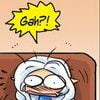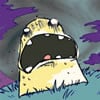| View previous topic :: View next topic |
| Author |
Message |
|
|
|
Ryu Shoji
Joined: 15 Jul 2009
Posts: 676
Location: Cambridge, United Kingdom
|
 Posted: Mon Feb 13, 2023 9:12 am Posted: Mon Feb 13, 2023 9:12 am
|
 |
|
|
This is a fantastic article that really nails a lot of my own thoughts on the head. I have autism, and my gateway into anime (aside from watching Pokémon and Yu-Gi-Oh! was Naruto, because I related to him being an underdog looked down on by everyone.
I only recently got into One Piece, and my favourite character quickly became Nico Robin, because I saw a lot of her behaviour in myself - how during the big party scenes, she’ll often be seen stood in the corner soaking up the excitement rather than contributing to it herself, and her tendency to say really weird things. Although Oda has not explicitly stated if Nico Robin was deliberately coded to be interpreted as autistic, seeing her interact with the other Straw Hats has helped combat over 20 years of me thinking that I’m “broken”, by showing me that it’s okay to be like that, and that the Straw Hats value her anyway.
|
| Back to top |
|
|
|
TsukasaElkKite
 Joined: 22 Nov 2005
Joined: 22 Nov 2005
Posts: 4040
|
 Posted: Mon Feb 13, 2023 9:55 am Posted: Mon Feb 13, 2023 9:55 am
|
 |
|
|
Very interesting article.
|
| Back to top |
|
|
|
Joe Mello
 Joined: 31 May 2004
Joined: 31 May 2004
Posts: 2328
Location: Online Terminal
|
 Posted: Mon Feb 13, 2023 2:42 pm Posted: Mon Feb 13, 2023 2:42 pm
|
 |
|
|
I think a super secret underlying theme of this article is how kids and adults process the same media differently, especially when that media needs to cut the proverbial crust off the sandwich to help its viewers consume it.
|
| Back to top |
|
|
|
Tanteikingdomkey
 Joined: 03 Sep 2008
Joined: 03 Sep 2008
Posts: 2351
|
 Posted: Mon Feb 13, 2023 3:33 pm Posted: Mon Feb 13, 2023 3:33 pm
|
 |
|
|
I can not speak to many shonen anime. However I do think it is highly likely that Luffy if not asta are absolutely written as if they were on the spectrum in my own opinion. Naruto I am not personally as sure about, and goku I have never watched the original show.
Another show in a similar track that does deserve more attention I think is Interviews with monster girls. It does a great job talking about special needs I think, not all of them being physical or mental.
|
| Back to top |
|
|
|
Shay Guy
 Joined: 03 Jul 2009
Joined: 03 Jul 2009
Posts: 2385
|
 Posted: Tue Feb 14, 2023 12:08 am Posted: Tue Feb 14, 2023 12:08 am
|
 |
|
I've had my own thoughts on shonen manga and neurodivergence, at least my own experience thereof, that are… a little less positive.
When watching Demon Slayer season 1 a few months back, it struck me that in the moral framing of a lot of anime and manga, and in particular shonen manga, one virtue seems to be prized above all others: being a "hard worker". Ideally, being someone with an endless, unquenchable, unbreakable passion and determination for Working Hard and Growing Stronger, burning your Cosmo to its limit and pressing ceaselessly toward whatever goal it is that the narrative wants you to. Which means that there is a clear "right way" to be neurodivergent, and it looks like this:
| Quote: | | Hyperfixation is also evident in the long-term dreams of shonen protagonists. For Luffy, it's becoming king of the pirates, Naruto wants to be hokage, Goku wants to become stronger and fight strong opponents, Asta wants to be the wizard king, Gon wants to become a hunter, Deku wants to become the number one hero, and so and so forth. Deku in particular is known for getting caught up in ramblings about hero stats, power analytics, strategy and attacks, hyperfocused on the niche details of his hyperfixation of heroes. He, Luffy, Naruto, and Asta are all obsessed with their dreams, always actively pushing towards that dream and stubbornly planting their feet whenever someone says they can't achieve it, stands in their way as an obstacle, or laughs at their aspirations. |
This is not what my own history looks like. I'm no Tanjiro Kamado or Taiki Inomata or Akane Osaki. Over and over, from adolescence on, I've had my mind captured by some hypothetical future and failed miserably to actualize it, or to have anything at all to show for my dream -- on a number of occasions starting out, quickly getting intimidated, discouraged, hopelessly lost or for some other reason paralyzed, distracted by fixating on other things that don't make me feel as helpless but also don't do me much good… and eventually burnt out, losing any belief that I'd ever get any further. Be it fanfic, NaNoWriMo, that one time I tried to join an open-source software project (AO3) and never made a single commit, web apps I could never so much as pick a framework for, the drawing class where I had a meltdown and later got a phone call asking me not to come back to, the writer's group at my library I went to all of one meeting of… you name it. And each time, my confidence crumples further, exacerbated by the number of times people I respected or thought I was on good terms with turned out to hold disdain for me. No yuujou, no doryoku, no shouri.
And it has been made clear to me that good people aren't like that. People worth caring about aren't like that. People we like, and like to hear stories about, aren't like that. Maybe you can worry or temporarily feel discouraged, sure, but only as long as they don't actually tangibly, perceptibly inhibit you. Hirohiko Araki wrote in Manga in Theory and Practice that a shonen protagonist must always be on an upward trajectory. His explanations make it clear to me that if readers were presented with my life, they'd lose patience with me and my stagnation and backsliding in a hurry -- as has been the case with real people in my life, enough times that I've learned more and more to worry that they're just enduring me, and sooner or later they'll run out of energy to be nice about it. (Twitter discourse can exacerbate some of this; I've occasionally seen "learned helplessness" treated as a vice.)
About a week ago, I finally saw the (excellent) movie Everything Everywhere All at Once, and I read afterward that it's also a work people have seen a lot of resonance with ADHD in. Protagonist Evelyn Wang is explicitly shown that there were countless ways she could have become someone amazing, clawed her way to triumph and glory -- and she failed to take any of those paths, leaving her life the wreck that it is. At one point the villain says, "Nothing matters. Feels nice, doesn't it? If nothing matters, then all the pain and guilt you feel for making nothing of your life goes away." With the amount of shame that's shaped my adult life, I think I resonate with all those feelings more than the shonen manga ideal of someone whose fixations cathartically, satisfyingly, turn out to be just what's needed.
…All right, enough agonizing over whether I've found the exact right way to express myself. Submitting now.
Last edited by Shay Guy on Tue Feb 14, 2023 3:15 pm; edited 1 time in total
|
| Back to top |
|
|
|
|
kotomikun
Joined: 06 May 2013
Posts: 1205
|
 Posted: Tue Feb 14, 2023 3:34 am Posted: Tue Feb 14, 2023 3:34 am
|
 |
|
I wouldn't tell someone not to relate to a character, but I've never really seen shonen protagonists in that way. Partly because autism comes in two flavors--no filter vs. overly cautious--and shonen characters are basically always the former. (You could maybe call Izuku an exception, but he never seemed autistic to me, more like a superhero fan with trauma over his ironic lack of powers causing him to grow up into a somewhat shy nerd).
But there's also just more obvious explanations for shonen hero tropes. They focus on one specific long-term goal so that the show can run for an inordinately long time without the (often very young) viewers losing track of the plot. They're underdogs because 99% of humans, especially children, feel like underdogs (another thing we can thank modern society for). They're weirdos because bland characters are boring and unmemorable. ADHD also has a lot of similarities to normal kid behavior (causing both overdiagnosis and, at the opposite end, belief that it doesn't even exist).
| Shay Guy wrote: | | in the moral framing of a lot of anime and manga, and in particular shonen manga, one virtue seems to be prized above all others: being a "hard worker". |
A consequence of both the notoriously intense Japanese work ethic, and the related capitalistic demand for maximum productivity from all humans. Part of why I don't watch a lot of shonen is because it encourages ridiculously high expectations for yourself, and I got too much of that without having watched anime as a kid. No matter how much workaholicism they embrace, most people won't grow up to be the absolute pinnacle of their field... heck, most careers outside of pro sports can't even be measured that way. And we wonder why there's an endless supply of isekai power fantasies for adults. The seeds were sown by One Piece, Naruto, and for the current generation, Demon Slayer.
Anime fandom does seem to attract neurodivergent people. I don't feel like that's because of shonen, though. After all, that's the genre most well-known outside of otaku-land, because it's relatable to a large percentage of people either in the moment or through nostalgia. Noticeably autistic-seeming characters--rather than larger-than-life but otherwise ordinary male teenagers--are more likely to appear in slice-of-life shows like Bocchi the Rock (I assume... still need to watch that one) or the relatively unknown movie Anthem of the Heart, which I will advertise to anyone willing to listen.
|
| Back to top |
|
|
|
|
SHD
Joined: 05 Apr 2015
Posts: 1759
|
 Posted: Tue Feb 14, 2023 6:13 am Posted: Tue Feb 14, 2023 6:13 am
|
 |
|
| kotomikun wrote: | | They're weirdos because bland characters are boring and unmemorable. |
I've had some interesting conversations about this with Japanese people a long time ago, and it seems that the main attraction of characters who are weirdos and/or really gruff, loud, etc. is that they're basically a sort of wishfulfillment - not in the way of having special powers, but for being allowed to behave in ways that most Japanese kids are not allowed to. Granted, this is probably less relevant today than even 20 years ago due to various changes in society, language usage, etc. driven partly by manga, but if you look at, for example, the way the Generic Shounen Action Hero speaks - even nowadays most real life people use this sort of hyper casual, very assertive style with friends only, while most shounen action heroes use it with most everyone in most situations, where it comes across as very rude and arrogant. Add this to their various "weird" traits, that make them again, stand out from the crowd, go against the grain. (Hell, they don't even necessarily translate as "weird" to western readers/viewers.) And watching them being loud and assertive, and doing things that the community frowns on, and having the mental fortitude to handle any social backlashes, or just the physical ability to beat up people disrespecting them for being different, is absolutely a type of wishfulfillment.
(Disclaimer: of course I'm not arguing that they can't be read as neurodivergent, of course, this is just my two cents re: the post above.)
|
| Back to top |
|
|
|
|
Dayraven
Joined: 21 Jul 2021
Posts: 184
|
 Posted: Tue Feb 14, 2023 7:33 am Posted: Tue Feb 14, 2023 7:33 am
|
 |
|
| Quote: | | slice-of-life shows like Bocchi the Rock (I assume... still need to watch that one) |
There are two major characters in Bocchi the Rock that invite an autistic reading. With her social anxiety issues, Bocchi is the obvious one, but Ryo’s content-loner nature and displays of hyperfixation fit as a different set of autistic markers. Plus there’s a gag about how Kita may be reading far too much into Ryo’s lack of emotional display.
|
| Back to top |
|
|
|
|
catandmouse
Joined: 02 Mar 2011
Posts: 224
|
 Posted: Tue Feb 14, 2023 6:25 pm Posted: Tue Feb 14, 2023 6:25 pm
|
 |
|
|
I am not neurodivergent and I’m also not male or a teenager, so I can’t say I’ve ever identified with any shonen protagonist ( I tend to like the anti-heroes better), but this article was very interesting and I think it paints a very good picture about identity. Lately I feel like the push has been in “diversity”and as long as there is a character that “looks” like you, that is good enough, but it’s more than that and I think this article illustrates that very nicely. I consume a lot of media (mainly reading), but I can’t honestly say I’ve ever really felt truly identified with any character (not that my enjoyment is lessened though). Then not too long ago a stumbled on this webcomic (that also happens to be a novel series) and reading that, I (for the first time) felt truly identified with some aspects of the main character’s thoughts and feelings. It was actually kinda elating to finally get that feeling, the funny thing is, this character is male and Korean, and I’m female and Hispanic, yet this was the character I’ve felt the most affinity with.
|
| Back to top |
|
|
|
|
The Chained Wolf
Joined: 21 Nov 2010
Posts: 18
|
 Posted: Sun Feb 19, 2023 11:04 am Posted: Sun Feb 19, 2023 11:04 am
|
 |
|
|
Nice article. As someone who is on the autistic spectrum, there is a part of me that considers those who are neurotypical as being “quirkless”.
|
| Back to top |
|
|
|
|
